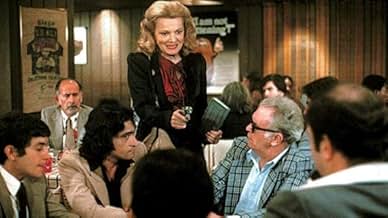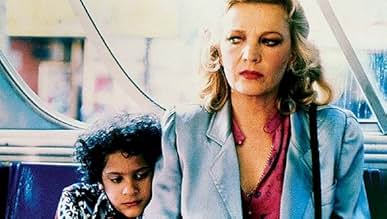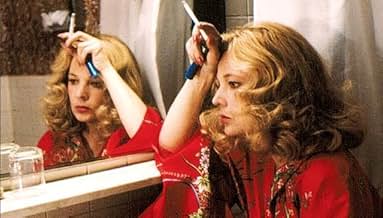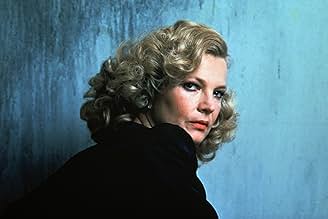AVALIAÇÃO DA IMDb
7,1/10
13 mil
SUA AVALIAÇÃO
Quando a máfia mata a família de um menino, sua vizinha Gloria se torna sua guardiã relutante. Com um livro que os gângsteres querem, a dupla vai para a fuga em Nova York.Quando a máfia mata a família de um menino, sua vizinha Gloria se torna sua guardiã relutante. Com um livro que os gângsteres querem, a dupla vai para a fuga em Nova York.Quando a máfia mata a família de um menino, sua vizinha Gloria se torna sua guardiã relutante. Com um livro que os gângsteres querem, a dupla vai para a fuga em Nova York.
- Indicado a 1 Oscar
- 4 vitórias e 5 indicações no total
Gary Howard Klar
- Irish Cop
- (as Gary Klar)
Avaliações em destaque
A genre-bending odyssey, full of dank, dark alleys, filthy side streets, buses, taxi cabs, trains and subways, John Cassavetes' film "Gloria" is perhaps the most impersonal of his personal work, which surely inspired Luc Besson's 1994 action-packed "Leon," the film explores the development of the mother-son bond under extreme circumstances.
One of Gena Rowland's most underrated performances, Gloria stands shoulder to shoulder with other iconic heroines of American cinema; such as Dietrich's Shanghai Lily and Uma Thurman's Beatrix Kiddo.
Cassavetes explores new narrative possibilities unlike any other of his contemporaries. Though there always seems to be a surplus of emotion, dialogue or trivialities in his work - and I'm not the first to make such an observation - Cassavetes maintains his focus, which is of course, to show us a slice of life, however extreme or crazy it may appear to an audience.
One of Gena Rowland's most underrated performances, Gloria stands shoulder to shoulder with other iconic heroines of American cinema; such as Dietrich's Shanghai Lily and Uma Thurman's Beatrix Kiddo.
Cassavetes explores new narrative possibilities unlike any other of his contemporaries. Though there always seems to be a surplus of emotion, dialogue or trivialities in his work - and I'm not the first to make such an observation - Cassavetes maintains his focus, which is of course, to show us a slice of life, however extreme or crazy it may appear to an audience.
Jack Dawn has let slip to his mob employers that he has kept a book of all transactions. Jeri Dawn has just seen some men lingering in the lobby downstairs. Together they realise that the hit has come and they start to try to leave. They give their youngest son, Phil, to neighbour Gloria to offer some hope for him although before leaving, Jack gives him his account ledger as protection. The mob slaughter the Dawn family but Phil and Gloria get away; however, with the information in their possession, Gloria soon finds that the mob still want the book back and the kid dead will Gloria's former relationship with members of the mob help or hinder her? With so many good things generally said about this film, I thought I'd better give it a go despite already having seen the remake. The good things about it are generally true it is quite engaging, Rowlands is pretty good and it is a bit tense. However I couldn't help but feel that the strengths were more than cancelled out by the weaknesses, not making it a bad film but making it only an OK one. The plot is gripping enough and has been redone several times since this film but somehow it doesn't always ring true and this criticism can be carried across to the lead character. Would she really greet each mobster with spits of "punk" etc and always be pulling a gun, perhaps in fear she would but here she looks like she is in control. In terms of her character, she is harsh to the kid but yet never shows the growing affection that we assume must be the reason she cannot bring herself to do the wrong thing and hand over the kid. She shows it right at the end but it is too late to be convincing by then.
This is not to take away from her performance, because it is strong, but it is not convincing as a person. Cassavetes has crafted a tough female but has done so to the point where she seems a few steps off being the Terminator. Adames may well be trying his best but he is annoying and his character was totally absent again not helped by the fact his material doesn't sound anything like a real person; contrast him with Portman in Leon and you'll see what a negative impact he had on the film. The mobsters are all Italian goons of the classic stereotype and they add nothing to the film in the way of actual menace. Cassavetes has done the job as director though and the film is quite tense while also capturing the city of New York of the time very well in regards atmosphere and grit.
Overall this is an OK film with an OK plot that is OK if you can get passed how unconvincing it all is. However it is no classic and the weaknesses and problems are difficult to ignore. Worth watching and perhaps better if you have low expectations but it is certainly anything like as good as its awards, names and reputation suggests that it will be.
This is not to take away from her performance, because it is strong, but it is not convincing as a person. Cassavetes has crafted a tough female but has done so to the point where she seems a few steps off being the Terminator. Adames may well be trying his best but he is annoying and his character was totally absent again not helped by the fact his material doesn't sound anything like a real person; contrast him with Portman in Leon and you'll see what a negative impact he had on the film. The mobsters are all Italian goons of the classic stereotype and they add nothing to the film in the way of actual menace. Cassavetes has done the job as director though and the film is quite tense while also capturing the city of New York of the time very well in regards atmosphere and grit.
Overall this is an OK film with an OK plot that is OK if you can get passed how unconvincing it all is. However it is no classic and the weaknesses and problems are difficult to ignore. Worth watching and perhaps better if you have low expectations but it is certainly anything like as good as its awards, names and reputation suggests that it will be.
You start with flinty, streetsmart gangster types, cross their paths with a little kid, put them in urban peril, and then you squeeze how things stack up for sentimentality, suspense and humor. It's a charming idea, and perhaps that's why this could be considered John Cassavetes's most conventional film. It tells the story of a gangster's girlfriend who goes on the run with a young boy who is being pursued by the mob for information he doesn't even know he might have. But he wants to tell the story his own way, obstructing every convention we would normally expect, instilling a realist perspective in how we follow the movie, making the pay-off that much more worthwhile. Cassavetes didn't intend to direct his script. He just wanted to sell the story to Columbia Pictures. But once his wife Gena Rowlands was asked to play Gloria, she obliged Cassavetes to direct it.
This underdog crime drama is particularly absorbing in its first hour, and ignites with a great beginning. We follow one character, it leads to another character, perspectives are interknit, the situation builds and Cassavetes has complete control over what we know and expect, all in spite of the all-too-familiar premise, which is then set for the rest of the movie, which is a cat-and-mouse hunt per the seedier locales of New York and New Jersey. He makes the threat so real that when the two key characters evade tangible danger, we still feel the tension whenever they round a corner, get in and out of cabs, and other such ordinary actions. He doesn't let on that unwanted company is present. It just happens. There is one scene that lasts for quite awhile before we realize, after Rowlands's title character does, that unwanted company has been there the entire time.
In an Oscar-nominated performance, Rowlands is expectedly the beautiful lead actress, but she sports a kind of masculine quality, creating a much more dense dynamic when she, afraid of her maternal instincts, finds them overpowering her lifelong self-preservation, and begrudgingly protects the boy. As the film progresses, however, she becomes more sincere in her protection, and integrates her love with her seasoned familiarity with how to stay alive in this town. In one creative take on the Fine, I Don't Need You Anyway scene, she asks a bartender, "There's reasons I can't turn and just look, but is there a little kid headed in here or across the street or whatever?" She drives her role with such honest irritable liveliness. Yet the kid is also well cast. He was a conspicuous little boy named John Adames with dark hair, big eyes and a way of trucking his dialogue as if confronting you to adjust a single word. It all works because everything about his character, the way he dresses, talks, revolts and moves, serves the naive notion that he is older, smarter and cooler than he is.
Cassavetes has a natural keenness for guilelessly unadorned location shooting in that he never plans, stages, waits on the weather or time of day, or hires extras or stunt drivers. Note how passers-by in the distance will often look on at the characters, whether Gloria has pulled a gun in a public place or not. Wherever the characters need to be, that place is in real time, as dirty, scuzzy and purely of the film's era as it would've normally been. There's a shabby flophouse where the clerk tells Gloria, "Just pick a room. They're all open." There are bus stations, back alleys, dimly lit hallways, and bars that open at dawn. And his occasional action scenes are so thrilling because of their surprise.
For once, Cassavetes doesn't stage indefinitely extensive scenes of dialogue wherein the actors indulge in their own view of their characters' unraveling. But I miss that. As I've already said, I am very impressed with how tightly he mounts suspense from the very beginning, how Gloria and the kid zip from cab to bus to cab to street to hotel to cab and so on. But regardless of how doggedly realistic he is in his portrayal of a recycled movie plot, he still relies upon that plot rather than the impositions of his characters flexing their wings.
This underdog crime drama is particularly absorbing in its first hour, and ignites with a great beginning. We follow one character, it leads to another character, perspectives are interknit, the situation builds and Cassavetes has complete control over what we know and expect, all in spite of the all-too-familiar premise, which is then set for the rest of the movie, which is a cat-and-mouse hunt per the seedier locales of New York and New Jersey. He makes the threat so real that when the two key characters evade tangible danger, we still feel the tension whenever they round a corner, get in and out of cabs, and other such ordinary actions. He doesn't let on that unwanted company is present. It just happens. There is one scene that lasts for quite awhile before we realize, after Rowlands's title character does, that unwanted company has been there the entire time.
In an Oscar-nominated performance, Rowlands is expectedly the beautiful lead actress, but she sports a kind of masculine quality, creating a much more dense dynamic when she, afraid of her maternal instincts, finds them overpowering her lifelong self-preservation, and begrudgingly protects the boy. As the film progresses, however, she becomes more sincere in her protection, and integrates her love with her seasoned familiarity with how to stay alive in this town. In one creative take on the Fine, I Don't Need You Anyway scene, she asks a bartender, "There's reasons I can't turn and just look, but is there a little kid headed in here or across the street or whatever?" She drives her role with such honest irritable liveliness. Yet the kid is also well cast. He was a conspicuous little boy named John Adames with dark hair, big eyes and a way of trucking his dialogue as if confronting you to adjust a single word. It all works because everything about his character, the way he dresses, talks, revolts and moves, serves the naive notion that he is older, smarter and cooler than he is.
Cassavetes has a natural keenness for guilelessly unadorned location shooting in that he never plans, stages, waits on the weather or time of day, or hires extras or stunt drivers. Note how passers-by in the distance will often look on at the characters, whether Gloria has pulled a gun in a public place or not. Wherever the characters need to be, that place is in real time, as dirty, scuzzy and purely of the film's era as it would've normally been. There's a shabby flophouse where the clerk tells Gloria, "Just pick a room. They're all open." There are bus stations, back alleys, dimly lit hallways, and bars that open at dawn. And his occasional action scenes are so thrilling because of their surprise.
For once, Cassavetes doesn't stage indefinitely extensive scenes of dialogue wherein the actors indulge in their own view of their characters' unraveling. But I miss that. As I've already said, I am very impressed with how tightly he mounts suspense from the very beginning, how Gloria and the kid zip from cab to bus to cab to street to hotel to cab and so on. But regardless of how doggedly realistic he is in his portrayal of a recycled movie plot, he still relies upon that plot rather than the impositions of his characters flexing their wings.
I have not seen the remake of GLORIA yet, and needless to say, I'm not looking forward to it. Not to say that Sharon Stone can't play a tough female, who's self-imposed as a bodyguard for a kid running from mobsters. It is just that Gena Rowlands is so much more versatile, and her range so much wider, and I just KNOW that Stone won't be able to cut it. So, I will stop speculating, and get to the facts.
GLORIA is a film that Cassavete's made as an antidote to brainless, violent action films. All of the violence has dramatic purpose, and nothing is pointless here. This may be off-putting to fans of the action genre, but Cassavetes' contempt for the genre is what makes GLORIA more interesting. There are several unexpected twists.
When the film begins, Gloria is a street-smart woman who is kind of "married" to the mob. Gloria has a tomboyish quality that lends credibility to the fact that she has lived this long. She looks out for herself, first and foremost.
This changes when a weasel, and friend,of Gloria's (Buck Henry) is murdered by her mobster friends. Henry and his wife are killed, leaving behind a scared child. The little boy is a witness to the murder, and the mobsters make chase.
Gloria feels her maternal instincts begin to take over, and begrudgingly protects the boy. As the film progresses, however, she becomes more sincere in her protection, and she draws the line further for the mobsters. She has survived in the harsh city for this long, so it is easy to assume that she knows how to stay alive.
GLORIA is by no means Cassavete best film. There are long stretches that test your patience, that can sometimes seem static. But, as much as I dislike this quality, I am familiar with several Cassavetes' films, and understand what he is trying to achieve. Cassavetes is a very emotional director. He doesn't focus on tragedy; he is more interested in survival and the baggage that that brings. GLORIA is a thinking-person's thriller, and if you prefer big explosions and high body-counts, go and see DIE HARD 2 again. But, if you want to see something different, check this one out.
GLORIA is a film that Cassavete's made as an antidote to brainless, violent action films. All of the violence has dramatic purpose, and nothing is pointless here. This may be off-putting to fans of the action genre, but Cassavetes' contempt for the genre is what makes GLORIA more interesting. There are several unexpected twists.
When the film begins, Gloria is a street-smart woman who is kind of "married" to the mob. Gloria has a tomboyish quality that lends credibility to the fact that she has lived this long. She looks out for herself, first and foremost.
This changes when a weasel, and friend,of Gloria's (Buck Henry) is murdered by her mobster friends. Henry and his wife are killed, leaving behind a scared child. The little boy is a witness to the murder, and the mobsters make chase.
Gloria feels her maternal instincts begin to take over, and begrudgingly protects the boy. As the film progresses, however, she becomes more sincere in her protection, and she draws the line further for the mobsters. She has survived in the harsh city for this long, so it is easy to assume that she knows how to stay alive.
GLORIA is by no means Cassavete best film. There are long stretches that test your patience, that can sometimes seem static. But, as much as I dislike this quality, I am familiar with several Cassavetes' films, and understand what he is trying to achieve. Cassavetes is a very emotional director. He doesn't focus on tragedy; he is more interested in survival and the baggage that that brings. GLORIA is a thinking-person's thriller, and if you prefer big explosions and high body-counts, go and see DIE HARD 2 again. But, if you want to see something different, check this one out.
There must be a million woman like Gloria. They never got educated but they're smart. They're good looking, but not enough to get that gangster boyfriend to leave his wife. They hostess or maybe they just are table dressing for as long as they can. They make enough to have a decent apartment, and they hock the gift jewelry and furs and stick the money in a safe deposit box for the day they just can't do it any more. Can't smile and nod and be sweet, and the goombas look to the younger girls for attention. They try to keep quiet and keep their nose clean and ignore the young punks that treat them a little worse every year.
But life can mess up your plans, as it does for Gloria when it dumps an orphaned kid in her lap and some of her p***ed gangster pals at her door. And the decision she makes to save the kid's life means she can never go back.
"Gloria" isn't really about stuff like violence or mobsters or guns at all. It's about the hopes and wishes and loneliness of a life that represents the lives of many invisible woman. Gloria has always been a "broad" as she says. Never the Madonna, to be worshipped and respected. Always the Whore to be stepped on. And it sucks to be at the mercy and whim of men. Especially cruel, stupid thugs who don't have the brains or guts to do anything but lie, cheat, steal, and kill women and children.
Gloria reluctantly gives up her old life. She gave years of her life to these slobs and she doesn't want to lose the little she got for her troubles. She just wants peace and quiet and to be left alone. Why give it up to help some annoying kid?
But when she makes the decision to do just that, her rage and resentment explode.
Gena Rowlands gives a flawless performance that burns bright and makes the viewer feel the rage of those who hide their intelligence and personality and try to "get by" in a world of lesser men. Gloria's got more balls and brains than any of the suits that run the racket. And now she's going to prove it.
"Gloria" is what happens when adults make movies for adults. No childish chatter, no idealized and airbrushed world, no moralizing and preaching. This movie has blood in its veins.
But life can mess up your plans, as it does for Gloria when it dumps an orphaned kid in her lap and some of her p***ed gangster pals at her door. And the decision she makes to save the kid's life means she can never go back.
"Gloria" isn't really about stuff like violence or mobsters or guns at all. It's about the hopes and wishes and loneliness of a life that represents the lives of many invisible woman. Gloria has always been a "broad" as she says. Never the Madonna, to be worshipped and respected. Always the Whore to be stepped on. And it sucks to be at the mercy and whim of men. Especially cruel, stupid thugs who don't have the brains or guts to do anything but lie, cheat, steal, and kill women and children.
Gloria reluctantly gives up her old life. She gave years of her life to these slobs and she doesn't want to lose the little she got for her troubles. She just wants peace and quiet and to be left alone. Why give it up to help some annoying kid?
But when she makes the decision to do just that, her rage and resentment explode.
Gena Rowlands gives a flawless performance that burns bright and makes the viewer feel the rage of those who hide their intelligence and personality and try to "get by" in a world of lesser men. Gloria's got more balls and brains than any of the suits that run the racket. And now she's going to prove it.
"Gloria" is what happens when adults make movies for adults. No childish chatter, no idealized and airbrushed world, no moralizing and preaching. This movie has blood in its veins.
Você sabia?
- CuriosidadesActress Gena Rowlands once said of her ex-gun moll character: "When I read the script, I knew I wanted a walk for her. I wanted something that, from the minute you saw me, you knew I could handle myself on the streets of New York. So I started thinking about when I lived in New York, how different I walked down the street when there was nobody but me. It was a walk that said, they'd better watch out."
- Erros de gravaçãoWhen Phil boards the train, the shot has been reversed, as evidenced by backwards lettering on the signs on the train and the platform.
Principais escolhas
Faça login para avaliar e ver a lista de recomendações personalizadas
- How long is Gloria?Fornecido pela Alexa
Detalhes
- Data de lançamento
- País de origem
- Centrais de atendimento oficiais
- Idiomas
- Também conhecido como
- Gloria
- Locações de filme
- Trinity Church Cemetery - 770 Riverside Drive, Manhattan, Nova Iorque, Nova Iorque, EUA(ending scene at Pittsburgh cemetery)
- Empresa de produção
- Consulte mais créditos da empresa na IMDbPro
Bilheteria
- Faturamento bruto nos EUA e Canadá
- US$ 4.059.673
- Fim de semana de estreia nos EUA e Canadá
- US$ 33.767
- 5 de out. de 1980
- Faturamento bruto mundial
- US$ 4.062.212
Contribua para esta página
Sugerir uma alteração ou adicionar conteúdo ausente































